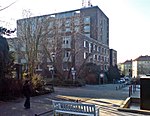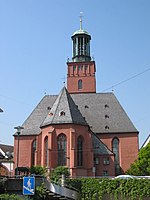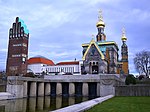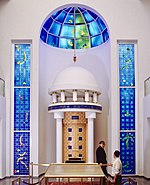University and State Library Darmstadt

The University and State Library Darmstadt (German: Universitäts- und Landesbibliothek Darmstadt (ULB)) supplies literature and information for members of the Technische Universität Darmstadt and the population of Darmstadt and southern Hesse. Purposes of the institution include education, research and teaching. As of 2021, the library has a stock of 4,756,277 publications with an annual circulation of 354,200; ULB has 220,000 visitors and employs a staff of 103.66 FTE. The ULB offers at three locations learning rooms and spaces for over 1000 people. As of 2023, the City Centre library opened 24 hours per day. Director is Thomas Stäcker. ULB Darmstadt is member of the Hessisches BibliotheksInformationssystem (hebis) (Hessian library information system).
Excerpt from the Wikipedia article University and State Library Darmstadt (License: CC BY-SA 3.0, Authors, Images).University and State Library Darmstadt
Magdalenenstraße, Darmstadt Martinsviertel-West (Darmstadt-Nord)
Geographical coordinates (GPS) Address External links Nearby Places Show on map
Geographical coordinates (GPS)
| Latitude | Longitude |
|---|---|
| N 49.87653 ° | E 8.65763 ° |
Address
Universitäts- und Landesbibliothek
Magdalenenstraße 8
64289 Darmstadt, Martinsviertel-West (Darmstadt-Nord)
Hesse, Germany
Open on Google Maps









